Wondering what to do with herbs in winter? If you have a thriving herb garden, you can proactively protect them by employing some of these ideas. Here’s everything you need to know about how to overwinter herbs and keep them happy all year long.
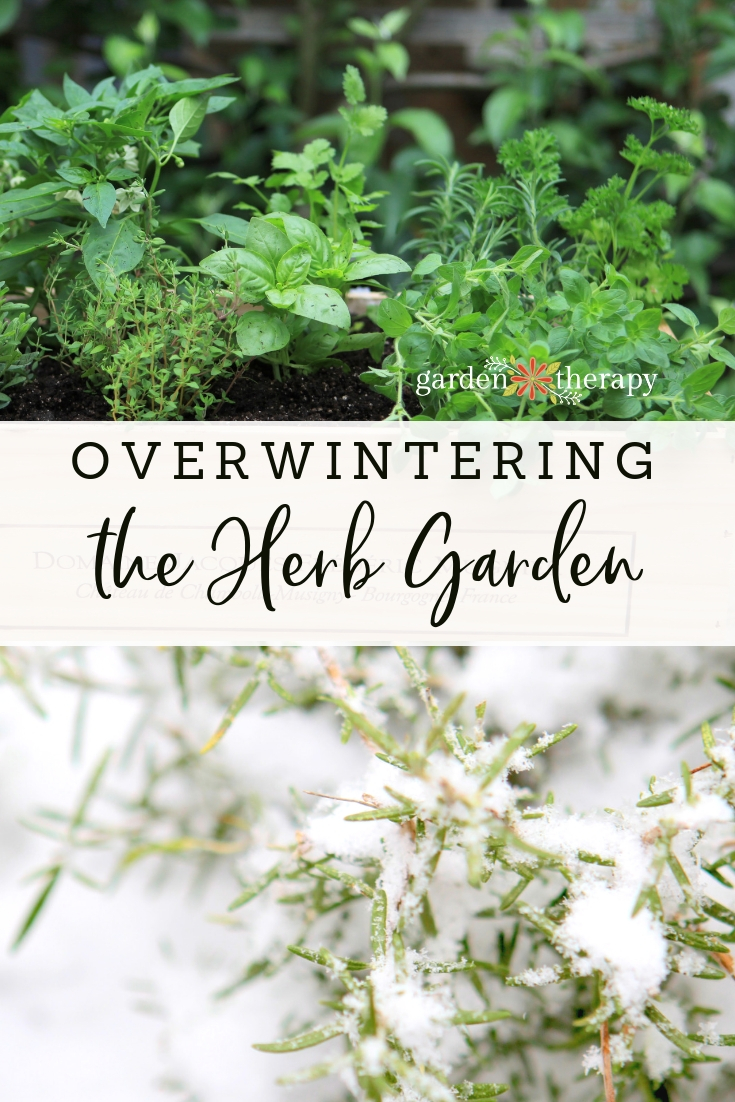
Homegrown herbs are wonderful to have on hand for culinary purposes, natural beauty recipes, and for their natural healing properties. Just because the cold season is beginning does not mean that you have to say goodbye to your herb garden.
Many herbs can overwinter outdoors if cared for properly. You can also preserve herbs in creative ways and overwinter them indoors. Learn how to overwinter herbs with these simple tips.
Herbs in Winter that Can Stay Outside
Some hardy herbs do well outdoors in all seasons. For these plants, you can leave them outdoors and trust that they will be back once the snow thaws if you follow the care guide below. Perennial herbs such as rosemary, sage, chives, winter savory, thyme, oregano, and mint can stay outdoors over the winter in many zones.
Herbs by Zone
Of course, as the weather varies greatly between different zones, so do the herbs in winter that can stay outside. Here’s a quick guide broken down by zone.
Perennial Herbs up to Zone 4
- Angelica
- Anise hyssop
- Bee balm
- French tarragon
- Garlic chives
- Lemon balm
- Lovage
- Sage
- Sweet cicely
Perennial Herbs up to Zone 5
- Caraway
- Chamomile
- Catnip
- Comfrey
- Echinacea
- Feverfew
- Lavender
- Mint hybrids (apple mint, chocolate mint, etc.)
- Oregano
- Parsley
- Savory
- Sorrel
Perennial Herbs Up to Zone 6
- Chervil
- Cilantro
- Dill
- Marjoram
- Rosemary
- Rue
- St. John’s Wort
- Valerian
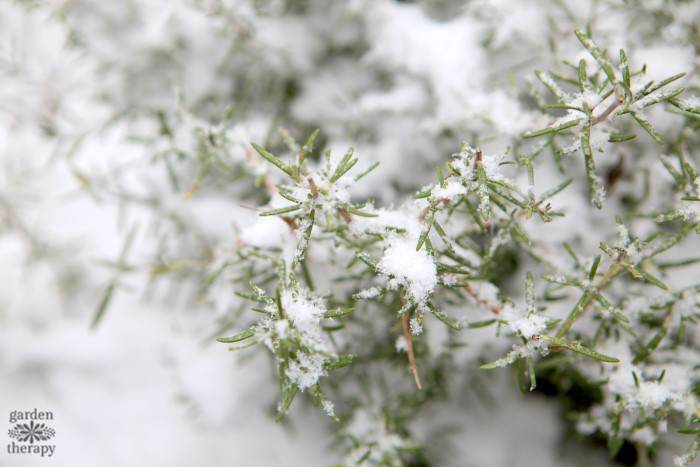
How to Prep Outdoor Herbs to Survive the Winter
Follow these steps to ensure that your herb garden is ready to face the elements.
Weeding
Start by removing any weeds growing up around the base of your herbs, so that they are not choked when they begin to grow again in the spring.
Pruning
Oregano, rosemary, lemon verbena, thyme, and sage can all overwinter outdoors and will benefit from a good prune in the fall. Trim away the uppermost leaves and any dead flower heads, and prune back all dead wood on the plant.
You’ll probably find that you’ve pruned away lots of usable herbs—see different ways of preserving them for use over the winter.
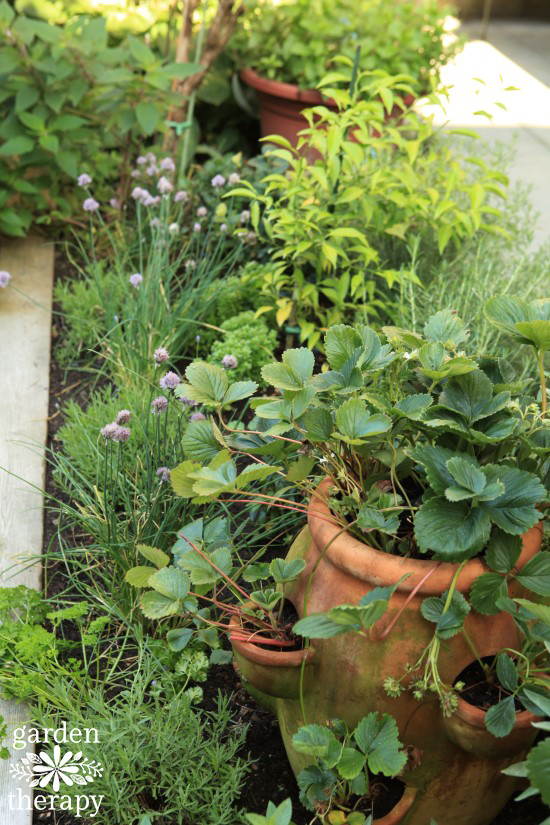
Protection
All herbs will benefit from a two-to-four-inch layer of mulch to prevent the ground from freezing and to shield them from the harsh winter cold. Some herbs will need extra coverage in the form of a burlap wrap, cardboard box, or horticultural fleece over them to keep them insulated.
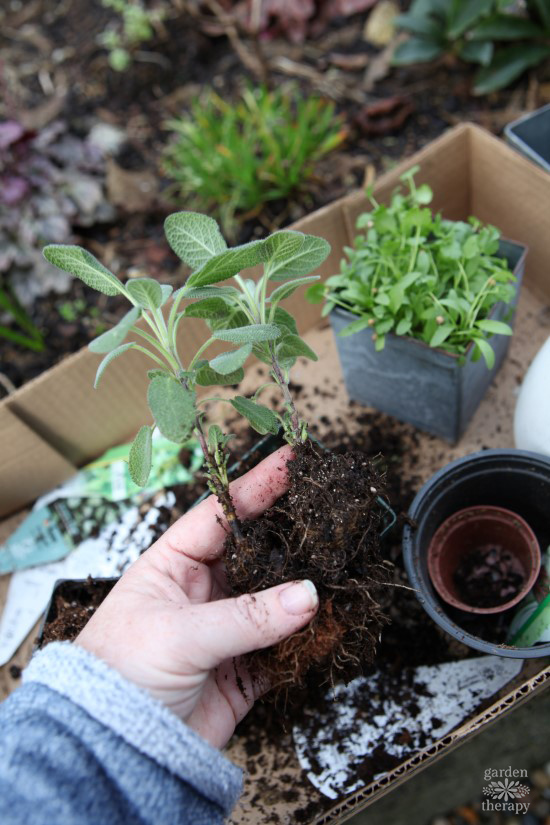
Herbs in Winter that Need to be Moved Inside
Annual herbs such as basil, pineapple sage, dill, borage, parsley, nasturtium, stevia, chamomile, and lemongrass are sensitive to cold temperatures. These herbs will likely not survive the harsh outdoor conditions.
Instead of digging these up completely, try propagating them from cuttings and growing them indoors. Growing basil from cuttings is particularly easy to do.
Both annual and perennial herbs can be planted in containers and brought inside before the first hard frost of the season. There are a ton of creative ways to grow herbs indoors. Not only will these plants look pretty on your kitchen windowsill or counter, but it’s a practical solution too. It is great to be able to harvest fresh herbs right from your kitchen as you are cooking!
Parsley can be difficult to dig up, as it has long roots that are easily disturbed. Dig deep beneath the plant and pot it in a container with a lot of depth, about ten inches.
Mint, thyme, and oregano are easy to dig out of the ground and take well to growing indoors.
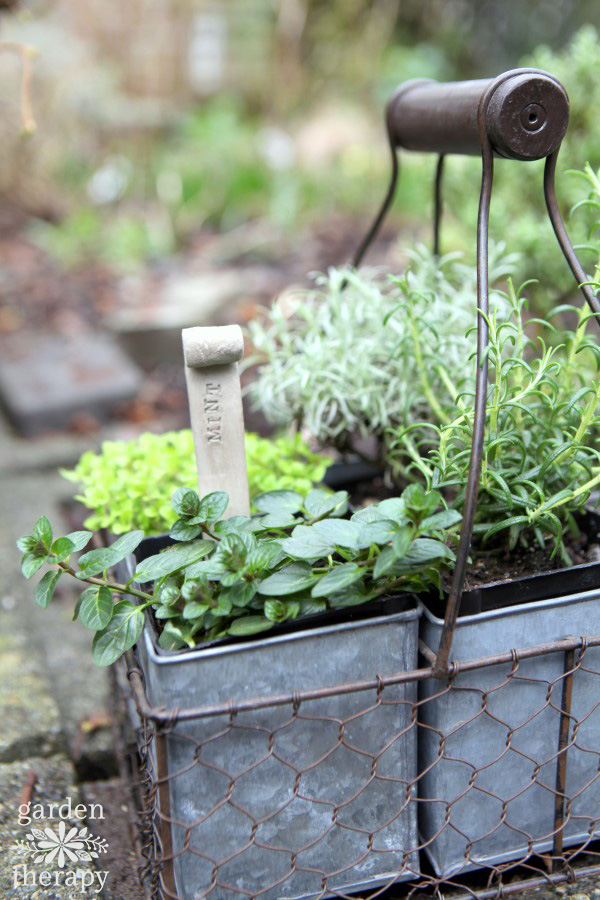
Rosemary can thrive indoors, but it can also be difficult. Your best bet is to place it in a window where it will be cool and get a lot of natural light. For more on this herb, keep an eye out for our upcoming Guide to Rosemary which will be posted soon.
Before bringing any herbs indoors, be sure to check them carefully for pests and pest damage. If you see any, spray the plants with a bit of soap mixed with water to get rid of unwelcome creepy crawlies.
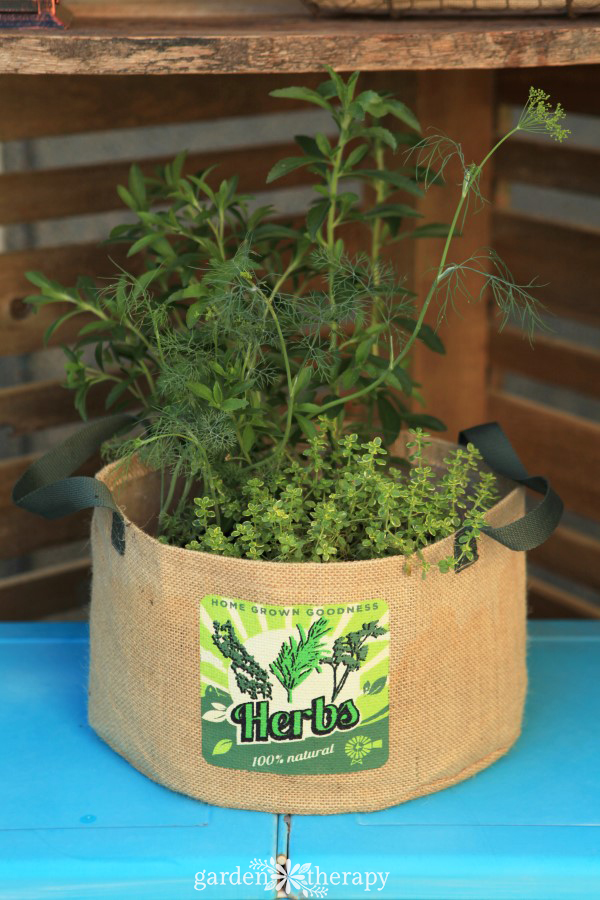
Amend the Soil
If you dig up your herbs and bring them indoors for the winter, it is the perfect time to add nutrients to the soil for next spring when you replant your herbs. Dig compost material into the soil and in the spring your bed will be richer and more nutritious, producing healthier, more prolific plants.
The good news is that amending your soil is an inexpensive and eco-friendly thing to do. For my book Garden Alchemy, I spent quite a bit of time experimenting and studying with natural soil amendments and found the results fascinating. I think you will too – see my post here about how to amend soil naturally.
More Ways to Protect Your Garden in the Winter
Herbs in winter aren’t the only plants that need your attention and care! Here’s how you can get a late harvest and protect the rest of your garden in the harsh winter months. It’s well worth the time and care in the colder months to see a thriving garden continue to live on year-round!
More Posts About Herbs:
- Find the Best Indoor Herb Garden for Any Space
- My Indoor Herb Growing Schedule Throughout the Year
- How to Harvest and Preserve Fresh Herbs
- Fresh Herb Finishing Salt Recipe
- Make a Winebox Herb Garden Fit for a Connoisseur
- 16 Recipes to Use and Preserve Fresh Basil

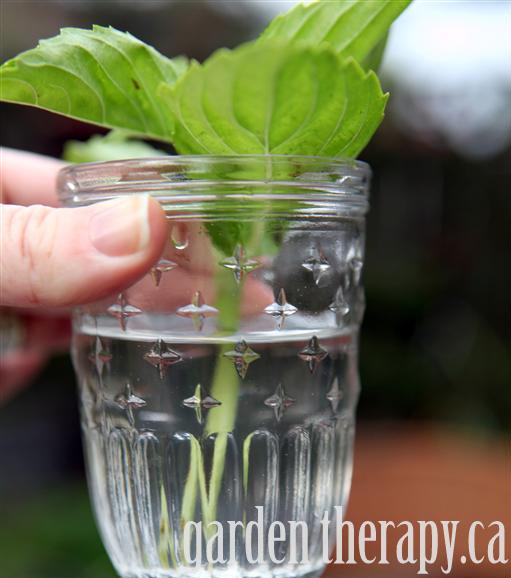
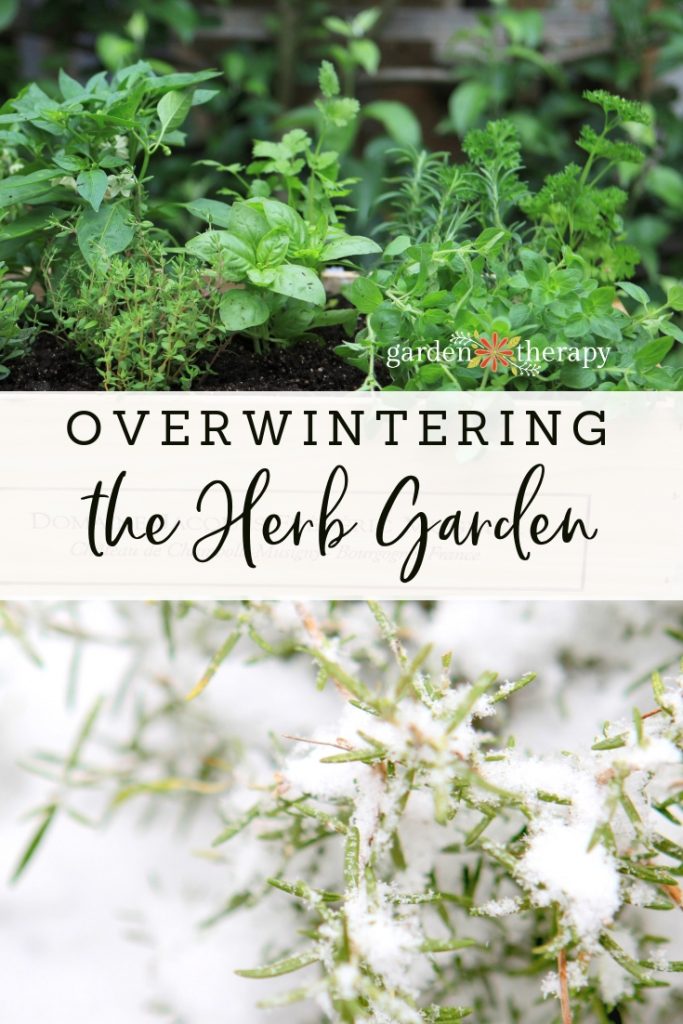
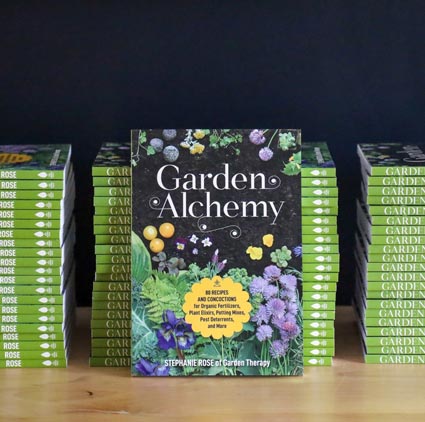


My granddaughter has just started some herbs as a seedling and they are going away fir aweek .Tgey are fairly high in pots.Can she take them out of her house to another place to be looked after while they are away.It is like -25 here.
Please can you tell me if you can take new seedlings that have been grown all winter in a house!out the door at – 20 below to another location for someone else to look after while on a holiday.I would appreciate a email back on this
The seedlings would be able to survive a quick trip to the pre-warmed car, but, it wouldn’t hurt to wrap them in a blanket even for that short trip to preserve the health of the leaves. Many seedlings can’t handle the ground freezing which is a distinct risk at -20, so keeping soil temperature maintained as much as possible is what’s going to keep them alive.
I often bring home plants during cold winter days, I put them in a plastic bag and close it then put that bag in to another bag and close it tight, so far it has worked well.
What is meant by zones, such as zone 4 and zone 5?
Yes, USDA hardiness zones.
I have planted a white sage plant that I overwintered last year. Can I protect it in the ground this year or do I need to bring it inside?
It depends where you live. It’s hardy to zones 7 or 8. I would take cuttings as the post recommends. The winter weather changes so much each year that it could make it one year and not the next.
I live in Barrie Ontario. What zone is this?
I’m in Vancouver BC but this post is for overwintering in all zones.